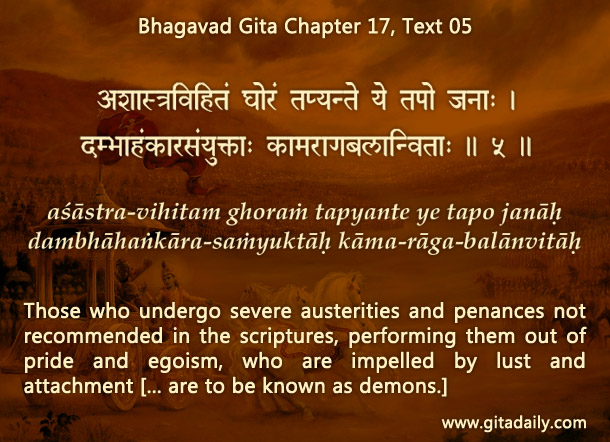When Arjuna seeks a nuanced understanding of the divine-demonic categorization (17.01), Krishna answers by providing several subtle and sophisticated parameters (17.09-22). But first Krishna continues the theme of nuancing by highlighting counterintuitive expressions of the demonic mentality (17.05-06).
In the sixteenth chapter, Krishna has described how the demonic mentality expresses itself in activities that are avaricious, malicious, even murderous — activities that can be easily identified as demonic. But sometimes the demonic mentality may impel one to do activities that seem the opposite of the demonic — activities that seem divine. One such activity is austerity.
If someone were performing severe austerities, rigidly regulating the desires of their senses and even the needs of their body, we would deem them self-controlled sages. But we might be disastrously wrong. Why? Because demons sometimes resort to austerities because they are hungry for the power to fulfill their demonic desires. And that hunger for power may enable them to perform austerities whose severity outshines the austerities done by celebrated sages. The deadly demon Hiranyakashipu is one such example (Bhagavatam 7.3). If someone had observed him only during the time when he was performing austerities, they would have deemed him a legendary sage.
By thus highlighting how the demonic nature is essentially a mentality, Krishna preps Arjuna for the battle he is about to fight. The opposite side had some leaders who were overtly demonic: Duryodhana and Dushasana, for example. And they had many allies whose activities weren’t at all demonic: Bhishma and Drona, for example. Yet these allies had somehow chosen to support a demonic cause; therefore, Arjuna needed to unsentimentally neutralize them. To do his difficult duty as a kshatriya, Arjuna needed to see this grim reality beyond their non-demonic appearance.
One-sentence summary:
The demonic mentality can be so subtle and sneaky as to express itself in activities such as austerity that seem not at all demonic.
Think it over:
- Why does Krishna give further description of the demonic nature in the seventeenth chapter?
- How might the demonic nature express itself in a non-demonic, or even divine activity?
- Why does Arjuna need a nuanced understanding of the demonic nature?
***
17.05: Those who undergo severe austerities and penances not recommended in the scriptures, performing them out of pride and egoism [… are to be known as demons].
To know more about this verse, please click on the image


Leave A Comment